ੴ
ੴ ॥
The Lord is One.
ਸ੍ਰੀ ਵਾਹਿਗੁਰੂ ਜੀ ਕੀ ਫ਼ਤਹ ॥
स्री वाहिगुरू जी की फ़तह ॥
The Lord is One and the victory is of the Lord.
ਪਾਤਿਸਾਹੀ ੧੦ ॥
पातिसाही १० ॥
The Tenth Sovereign:
ਤ੍ਵਪ੍ਰਸਾਦਿ ॥ ਸ੍ਵਯੇ ॥
त्वप्रसादि ॥ स्वये ॥
BY THY GRACE SWAYYAS
ਸ੍ਰਾਵਗ ਸੁੱਧ ਸਮੂਹ ਸਿਧਾਨ ਕੇ ਦੇਖਿ ਫਿਰਿਓ ਘਰ ਜੋਗ ਜਤੀ ਕੇ ॥
स्रावग सु्ध समूह सिधान के देखि फिरिओ घर जोग जती के ॥
I have seen during my tours pure Sravaks (Jaina and Buddhist monks), group of adepts and abodes of ascetics and Yogi.
ਸੂਰ ਸੁਰਾਰਦਨ ਸੁੱਧ ਸੁਧਾਦਿਕ ਸੰਤ ਸਮੂਹ ਅਨੇਕ ਮਤੀ ਕੇ ॥
सूर सुरारदन सु्ध सुधादिक संत समूह अनेक मती के ॥
Valiant heroes, demons killing gods, gods drinking nectar and assemblies of saints of various sects.
ਸਾਰੇ ਹੀ ਦੇਸ ਕੋ ਦੇਖਿ ਰਹਿਓ ਮਤ ਕੋਊ ਨ ਦੇਖੀਅਤ ਪ੍ਰਾਨਪਤੀ ਕੇ ॥
सारे ही देस को देखि रहिओ मत कोऊ न देखीअत प्रानपती के ॥
I have seen the disciplines of the religious systems of all the countries, but seen none of the Lord, the Master of my life.
ਸ੍ਰੀ ਭਗਵਾਨ ਕੀ ਭਾਇ ਕ੍ਰਿਪਾ ਹੂ ਤੇ ਏਕ ਰਤੀ ਬਿਨੁ ਏਕ ਰਤੀ ਕੇ ॥੧॥੨੧॥
स्री भगवान की भाइ क्रिपा हू ते एक रती बिनु एक रती के ॥१॥२१॥
They are worth nothing without an iota of the Grace of the Lord. 1.21.
ਮਾਤੇ ਮਤੰਗ ਜਰੇ ਜਰ ਸੰਗ ਅਨੂਪ ਉਤੰਗ ਸੁਰੰਗ ਸਵਾਰੇ ॥
माते मतंग जरे जर संग अनूप उतंग सुरंग सवारे ॥
With intoxicated elephants, studded with gold, incomparable and huge, painted in bright colours.
ਕੋਟ ਤੁਰੰਗ ਕੁਰੰਗ ਸੇ ਕੂਦਤ ਪਉਨ ਕੇ ਗਉਨ ਕਉ ਜਾਤ ਨਿਵਾਰੇ ॥
कोट तुरंग कुरंग से कूदत पउन के गउन कउ जात निवारे ॥
With millions of horses galloping like deer, moving faster than the wind.
ਭਾਰੀ ਭੁਜਾਨ ਕੇ ਭੂਪ ਭਲੀ ਬਿਧਿ ਨਿਆਵਤ ਸੀਸ ਨ ਜਾਤ ਬਿਚਾਰੇ ॥
भारी भुजान के भूप भली बिधि निआवत सीस न जात बिचारे ॥
With many kings indescribable, having long arms (of heavy allied forces), bowing their heads in fine array.
ਏਤੇ ਭਏ ਤੁ ਕਹਾ ਭਏ ਭੂਪਤਿ ਅੰਤ ਕੌ ਨਾਂਗੇ ਹੀ ਪਾਂਇ ਪਧਾਰੇ ॥੨॥੨੨॥
एते भए तु कहा भए भूपति अंत कौ नांगे ही पांइ पधारे ॥२॥२२॥
What matters if such mighty emperors were there, because they had to leave the world with bare feet.2.22.
ਜੀਤ ਫਿਰੈ ਸਭ ਦੇਸ ਦਿਸਾਨ ਕੋ ਬਾਜਤ ਢੋਲ ਮ੍ਰਿਦੰਗ ਨਗਾਰੇ ॥
जीत फिरै सभ देस दिसान को बाजत ढोल म्रिदंग नगारे ॥
With the beat of drums and trumpets if the emperor conquers all the countries.
ਗੁੰਜਤ ਗੂੜ ਗਜਾਨ ਕੇ ਸੁੰਦਰ ਹਿੰਸਤ ਹੈਂ ਹਯਰਾਜ ਹਜਾਰੇ ॥
गुंजत गूड़ गजान के सुंदर हिंसत हैं हयराज हजारे ॥
Along with many beautiful roaring elephants and thousands of neighing houses of best breed.
ਭੂਤ ਭਵਿੱਖ ਭਵਾਨ ਕੇ ਭੂਪਤ ਕਉਨੁ ਗਨੈ ਨਹੀਂ ਜਾਤ ਬਿਚਾਰੇ ॥
भूत भवि्ख भवान के भूपत कउनु गनै नहीं जात बिचारे ॥
Such like emperors of the past, present and future cannot be counted and ascertained.
ਸ੍ਰੀ ਪਤਿ ਸ੍ਰੀ ਭਗਵਾਨ ਭਜੇ ਬਿਨੁ ਅੰਤ ਕਉ ਅੰਤ ਕੇ ਧਾਮ ਸਿਧਾਰੇ ॥੩॥੨੩॥
स्री पति स्री भगवान भजे बिनु अंत कउ अंत के धाम सिधारे ॥३॥२३॥
But without remembering the Name of the Lord, they ultimately leave for their final abode. 3.23.
ਤੀਰਥ ਨਾਨ ਦਇਆ ਦਮ ਦਾਨ ਸੁ ਸੰਜਮ ਨੇਮ ਅਨੇਕ ਬਿਸੇਖੈ ॥
तीरथ नान दइआ दम दान सु संजम नेम अनेक बिसेखै ॥
Taking bath at holy places, exercising mercy, controlling passions, performing acts of charity, practicing austerity and many special rituals.
ਬੇਦ ਪੁਰਾਨ ਕਤੇਬ ਕੁਰਾਨ ਜਮੀਨ ਜਮਾਨ ਸਬਾਨ ਕੇ ਪੇਖੈ ॥
बेद पुरान कतेब कुरान जमीन जमान सबान के पेखै ॥
Studying of Vedas, Puranas and holy Quran and scanning all this world and the next world.
ਪਉਨ ਅਹਾਰ ਜਤੀ ਜਤ ਧਾਰ ਸਬੈ ਸੁ ਬਿਚਾਰ ਹਜਾਰਕ ਦੇਖੈ ॥
पउन अहार जती जत धार सबै सु बिचार हजारक देखै ॥
Subsisting only on air, practicing continence and meeting thousands of persons of all good thoughts.
ਸ੍ਰੀ ਭਗਵਾਨ ਭਜੇ ਬਿਨੁ ਭੂਪਤਿ ਏਕ ਰਤੀ ਬਿਨੁ ਏਕ ਨ ਲੇਖੈ ॥੪॥੨੪॥
स्री भगवान भजे बिनु भूपति एक रती बिनु एक न लेखै ॥४॥२४॥
But O King! Without the remembrance of the Name of the Lord, all this is of no account, being without an iota of the Grace of the Lord. 4.24.
ਸੁੱਧ ਸਿਪਾਹ ਦੁਰੰਤ ਦੁਬਾਹ ਸੁ ਸਾਜ ਸਨਾਹ ਦੁਰਜਾਨ ਦਲੈਂਗੇ ॥
सु्ध सिपाह दुरंत दुबाह सु साज सनाह दुरजान दलैंगे ॥
The trained soldiers, mightly and invincible, clad in coat of mail, who would be able to crush the enemies.
ਭਾਰੀ ਗੁਮਾਨ ਭਰੇ ਮਨ ਮੈਂ ਕਰ ਪਰਬਤ ਪੰਖ ਹਲੇ ਨ ਹਲੈਂਗੇ ॥
भारी गुमान भरे मन मैं कर परबत पंख हले न हलैंगे ॥
With great ego in their mind that they would not be vanquished even if the mountains move with wings.
ਤੋਰਿ ਅਰੀਨ ਮਰੋਰਿ ਮਵਾਸਨ ਮਾਤੇ ਮਤੰਗਨ ਮਾਨ ਮਲੈਂਗੇ ॥
तोरि अरीन मरोरि मवासन माते मतंगन मान मलैंगे ॥
They would destroy the enemies, twist the rebels and smash the pride of intoxicated elephants.
ਸ੍ਰੀ ਪਤਿ ਸ੍ਰੀ ਭਗਵਾਨ ਕ੍ਰਿਪਾ ਬਿਨੁ ਤਿਆਗਿ ਜਹਾਨ ਨਿਦਾਨ ਚਲੈਂਗੇ ॥੫॥੨੫॥
स्री पति स्री भगवान क्रिपा बिनु तिआगि जहान निदान चलैंगे ॥५॥२५॥
But without the Grace of the Lord-God, they would ultimately leave the world. 5.25.
ਬੀਰ ਅਪਾਰ ਬਡੇ ਬਰਿਆਰ ਅਬਿਚਾਰਹਿ ਸਾਰ ਕੀ ਧਾਰ ਭਛੱਯਾ ॥
बीर अपार बडे बरिआर अबिचारहि सार की धार भछ्या ॥
Innumerable brave and mighty heroes, fearlessly facing the edge of the sword.
ਤੋਰਤ ਦੇਸ ਮਲਿੰਦ ਮਵਾਸਨ ਮਾਤੇ ਗਜਾਨ ਕੇ ਮਾਨ ਮਲੱਯਾ ॥
तोरत देस मलिंद मवासन माते गजान के मान मल्या ॥
Conquering the countries, subjugating the rebels and crushing the pride of the intoxicated elephants.
ਗਾੜ੍ਹੇ ਗੜ੍ਹਾਨ ਕੋ ਤੋੜਨਹਾਰ ਸੁ ਬਾਤਨ ਹੀਂ ਚਕ ਚਾਰ ਲਵੱਯਾ ॥
गाड़्हे गड़्हान को तोड़नहार सु बातन हीं चक चार लव्या ॥
Capturing the strong forts and conquering all sides with mere threats.
ਸਾਹਿਬੁ ਸ੍ਰੀ ਸਭ ਕੋ ਸਿਰਨਾਇਕ ਜਾਚਕ ਅਨੇਕ ਸੁ ਏਕ ਦਿਵੱਯਾ ॥੬॥੨੬॥
साहिबु स्री सभ को सिरनाइक जाचक अनेक सु एक दिव्या ॥६॥२६॥
The Lord God is the Cammander of all and is the only Donor, the beggars are many. 6.26.
ਦਾਨਵ ਦੇਵ ਫਨਿੰਦ ਨਿਸਾਚਰ ਭੂਤ ਭਵਿੱਖ ਭਵਾਨ ਜਪੈਂਗੇ ॥
दानव देव फनिंद निसाचर भूत भवि्ख भवान जपैंगे ॥
Demons, gods, huge serpents, ghosts, past, present and future would repeat His Name.
ਜੀਵ ਜਿਤੇ ਜਲ ਮੈ ਥਲ ਮੈ ਪਲ ਹੀ ਪਲ ਮੈ ਸਭ ਥਾਪ ਥਪੈਂਗੇ ॥
जीव जिते जल मै थल मै पल ही पल मै सभ थाप थपैंगे ॥
All the creatures in the sea and on land would increase and the heaps of sins would be destroyed.
ਪੁੰਨ ਪ੍ਰਤਾਪਨ ਬਾਢ ਜੈਤ ਧੁਨ ਪਾਪਨ ਕੇ ਬਹੁ ਪੁੰਜ ਖਪੈਂਗੇ ॥
पुंन प्रतापन बाढ जैत धुन पापन के बहु पुंज खपैंगे ॥
The praises of the glories of virtues would increase and the heaps of sins would be destroyed
ਸਾਧ ਸਮੂਹ ਪ੍ਰਸੰਨ ਫਿਰੈਂ ਜਗ ਸਤ੍ਰ ਸਭੈ ਅਵਲੋਕ ਚਪੈਂਗੇ ॥੭॥੨੭॥
साध समूह प्रसंन फिरैं जग सत्र सभै अवलोक चपैंगे ॥७॥२७॥
All the saints would wander in the world with bliss and the enemies would be annoyed on seeing them.7.27.
ਮਾਨਵ ਇੰਦ੍ਰ ਗਜਿੰਦ੍ਰ ਨਰਾਧਪ ਜੌਨ ਤ੍ਰਿਲੋਕ ਕੋ ਰਾਜ ਕਰੈਂਗੇ ॥
मानव इंद्र गजिंद्र नराधप जौन त्रिलोक को राज करैंगे ॥
King of men and elephants, emperors who would rule over the three worlds.
ਕੋਟਿ ਇਸਨਾਨ ਗਜਾਦਿਕ ਦਾਨ ਅਨੇਕ ਸੁਅੰਬਰ ਸਾਜ ਬਰੈਂਗੇ ॥
कोटि इसनान गजादिक दान अनेक सुअमबर साज बरैंगे ॥
Who would perform millions of ablutions, give elephants and other animals in charity and arrange many svayyamuaras (self-marriage functions) for weddings.
ਬ੍ਰਹਮ ਮਹੇਸਰ ਬਿਸਨ ਸਚੀਪਿਤ ਅੰਤ ਫਸੇ ਜਮ ਫਾਸਿ ਪਰੈਂਗੇ ॥
ब्रहम महेसर बिसन सचीपित अंत फसे जम फासि परैंगे ॥
Brahma, Shiva, Vishnu and Consort of Sachi (Indra) would ultimately fall in the noose of death.
ਜੇ ਨਰ ਸ੍ਰੀ ਪਤਿ ਕੇ ਪ੍ਰਸ ਹੈਂ ਪਗ ਤੇ ਨਰ ਫੇਰ ਨ ਦੇਹ ਧਰੈਂਗੇ ॥੮॥੨੮॥
जे नर स्री पति के प्रस हैं पग ते नर फेर न देह धरैंगे ॥८॥२८॥
But those who fall at the feet of Lord-God, they would not appear again in physical form. 8.28.
ਕਹਾ ਭਯੋ ਜੋ ਦੋਉ ਲੋਚਨ ਮੂੰਦ ਕੈ ਬੈਠਿ ਰਹਿਓ ਬਕ ਧਿਆਨ ਲਗਾਇਓ ॥
कहा भयो जो दोउ लोचन मूंद कै बैठि रहिओ बक धिआन लगाइओ ॥
Of what use it is if one sits and meditates like a crane with his eyes closed.
ਨ੍ਹਾਤ ਫਿਰਿਓ ਲੀਏ ਸਾਤ ਸਮੁਦ੍ਰਨਿ ਲੋਕ ਗਯੋ ਪਰਲੋਕ ਗਵਾਇਓ ॥
न्हात फिरिओ लीए सात समुद्रनि लोक गयो परलोक गवाइओ ॥
If he takes bath at holy places upto the seventh sea, he loses this world and also the next world.
ਬਾਸ ਕੀਓ ਬਿਖਿਆਨ ਸੋ ਬੈਠ ਕੈ ਐਸੇ ਹੀ ਐਸੇ ਸੁ ਬੈਸ ਬਿਤਾਇਓ ॥
बास कीओ बिखिआन सो बैठ कै ऐसे ही ऐसे सु बैस बिताइओ ॥
He spends his life in such performing evil actions and wastes his life in such pursuits.
ਸਾਚੁ ਕਹੋਂ ਸੁਨ ਲੇਹੁ ਸਭੈ ਜਿਨ ਪ੍ਰੇਮ ਕੀਓ ਤਿਨ ਹੀ ਪ੍ਰਭ ਪਾਇਓ ॥੯॥੨੯॥
साचु कहों सुन लेहु सभै जिन प्रेम कीओ तिन ही प्रभ पाइओ ॥९॥२९॥
I speak Truth, all should turn their ears towards it: he, who is absorbed in True Love, he would realize the Lord. 9.29.
ਕਾਹੂ ਲੈ ਪਾਹਨ ਪੂਜ ਧਰਯੋ ਸਿਰ ਕਾਹੂ ਲੈ ਲਿੰਗ ਗਰੇ ਲਟਕਾਇਓ ॥
काहू लै पाहन पूज धरयो सिर काहू लै लिंग गरे लटकाइओ ॥
Someone worshipped stone and placed it on his head. Someone hung the phallus (lingam) from his neck.
ਕਾਹੂ ਲਖਿਓ ਹਰਿ ਅਵਾਚੀ ਦਿਸਾ ਮਹਿ ਕਾਹੂ ਪਛਾਹ ਕੋ ਸੀਸੁ ਨਿਵਾਇਓ ॥
काहू लखिओ हरि अवाची दिसा महि काहू पछाह को सीसु निवाइओ ॥
Someone visualized God in the South and someone bowed his head towards the West.
ਕੋਉ ਬੁਤਾਨ ਕੋ ਪੂਜਤ ਹੈ ਪਸੁ ਕੋਉ ਮ੍ਰਿਤਾਨ ਕੋ ਪੂਜਨ ਧਾਇਓ ॥
कोउ बुतान को पूजत है पसु कोउ म्रितान को पूजन धाइओ ॥
Some fool worships the idols and someone goes to worship the dead.
ਕੂਰ ਕ੍ਰਿਆ ਉਰਿਝਓ ਸਭ ਹੀ ਜਗ ਸ੍ਰੀ ਭਗਵਾਨ ਕੋ ਭੇਦੁ ਨ ਪਾਇਓ ॥੧੦॥੩੦॥
कूर क्रिआ उरिझओ सभ ही जग स्री भगवान को भेदु न पाइओ ॥१०॥३०॥
The whole world is entangled in false rituals and has not known the secret of Lord-God 10.30.
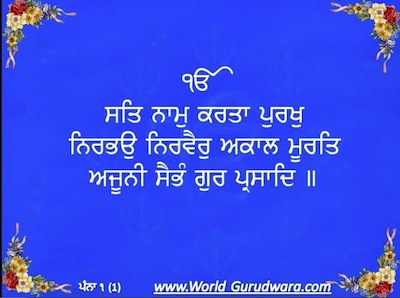
Japji Sahib ji
Guru Nanak Dev Ji’s Mool Mantra followed by 38 hymns and a final Salok is at the very beginning of the Guru Granth Sahib. It is regarded as the most important Bani or ‘set of verses’ and is recited every morning by all practicing Sikhism.

Jaap Sahib ji
Jaap Sahib was composed by Sri Guru Gobind Singh ji. The Jaap Sahib is the first Bani in the Dasam Granth, which is said to have been compiled by Bhai Mani Singh around the year 1734.
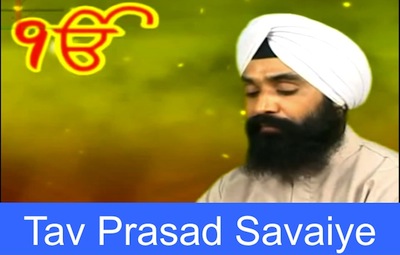
Tav Prasad Savaiye
This is a short hymn of 10 stanzas. It is a part of Guru Gobind Singh’s composition Akal Ustat (The praise of God). This Bani appears in the Dasam Granth on pages 13 to 15.
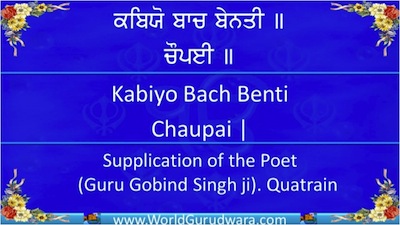
Chaupai Sahib ji
Chaupai is the 405th Chittar of the Charitropakhyan of the Dasam Granth by Guru Gobind Singh ji. Sikhs recite this Bani to gain spiritual safety and defense from external and internal enemies, worries and afflictions. The Gurmukhi gives one self-confidence and an upbeat feeling. This Bani gives one the feeling of reliability and dependability on Wahe Guru Ji.

Anand Sahib ji
The word Anand means complete happiness and it is said that the person reciting this Bani in the morning with dedication, attention, and comprehension can achieve happiness and peace of mind. The Anand Sahib is written by Guru Amar Das ji, the third Guru. This Bani appears on pages 917 to 922 of Sri Guru Granth Sahib ji.
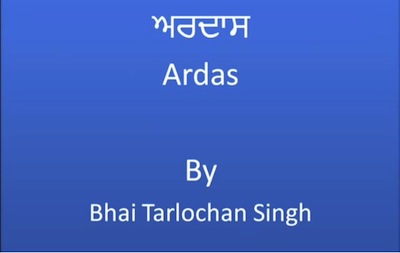
Ardas
The Ardās is done before performing or after undertaking any significant task; after reciting the morning and evening Banis, at the completion of a service like the Paath, kirtan or any other religious program. Ardās may also be said before and after eating. The prayer is a supplication to God to support and help the devotee with whatever he or she is about to undertake or has done.
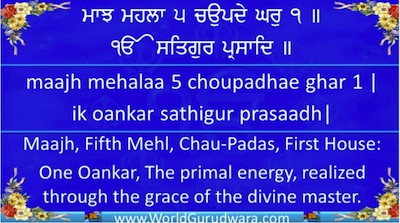
Shabad Hazare
Guru Gobind Singh ji describes his philosophy and inherent beliefs of Dharam and its perception. Speaking against mindless rituals, and beliefs in many Gods (as opposed to belief in the One), the ballads narrate the greatness of the Almighty.
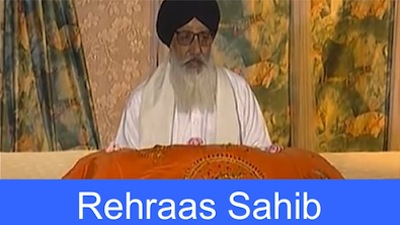
Rehras Sahib
Rehraas Sahib is collection of hymns of five different Gurus. The Rehras as recorded in the Guru Granth Sahib contains hymns of only Guru Nanakji, Guru Amardas ji, Guru Ramdas ji and Guru Arjan Dev ji. The compositions of Guru Gobind Singh ji were added in Rehras Sahib.
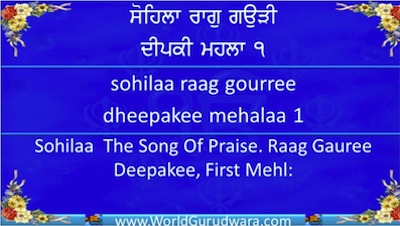
Kirtan Sohila
Three Gurus — Guru Nanak, Guru Ram Das and Guru Arjan – contributed five shabads on the pain of separation and celebrating the bliss of union. The first three Shabads were uttered by Guru Nanak, the fourth by Guru Ram Das and the fifth by Guru Arjan Dev. This is the night prayer said by all Sikhs before sleeping.
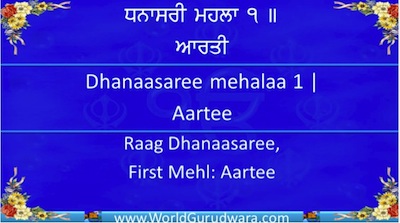
Aarti
This is a compiled Bani from Guru Granth Sahib Ji and Dasam Granth. Various parts are composed by Guru Nanak Dev Ji, Bhagat Kabir ji, Bhagat RaviDass Ji and Guru Gobind Singh Ji.
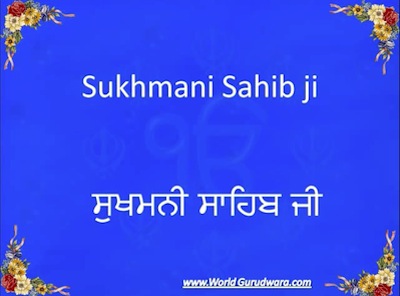
Sukhmani Sahib
Sukhmani literally means Peace in your mind. this Bani is believed to bring peace to one’s mind and compoundly peace to the world. This set of 192 hymns were compiled by the fifth Sikh Guru, Guru Arjan Dev Ji. This is divided into 24 sections in the Sri Guru Granth Sahib ji on page 262. Each section, which is called an Ashtpadi(asht means 8), consists of 8 hymns per Ashtpadi.

Asa Di Var
It is a collection of 24 pauris or stanzas by Guru Nanak Dev ji on page 462-475 in Sri Guru Granth Sahib ji. Guru Arjan Dev ji also added a few Sloks of Guru Angad Dev ji. These Sloks are tied together in a way that they relate to the same theme as highlighted in the pauri. Asa Di Var also contains a few shabads recited by Guru Ram Das ji.

Ramkali Ki Vaar
Ramkali Ki Var, also known as Tikke di Var, is the joint composition of the Balvand and Satta. The Var comprises of eight pauns or stanzas, of unequal length, varying from seven to twenty-one lines.

Basant Ki Var
Basant Ki Var, by Guru Arjan Dev, is the shortest of the twentytwo vars. Vars are heroic ballads included in the Guru Granth Sahib. Basant, is the Punjabi word for spring from which the musical measure the Var derives its title. Like Malhar (the raga of the rainy season) the Basant Ki Var is an ancient seasonal raga – the raga of springtime.

Barah Maah Maajh
It is a form of folk poetry in which the emotions and yearnings of the human heart are expressed in terms of the changing moods of Nature over the twelve months of the year. Guru Nanak Dev ji’s Barah Maha is the oldest composition in this genre transforming into spirituality. This is followed by Guru Arjan’s Barah Maha.
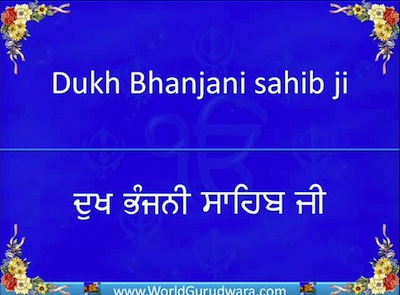
Dukh Bhanjani Sahib
It begins with the shabad “Dukh bhanjan tera naam meaning “The Destroyer of Suffering is Thy Name”. It is a compilation of scripture which includes many shabads written by fifth Guru Arjun Dev ji during the illness and healing of his young son sixth Guru Hargobind ji.
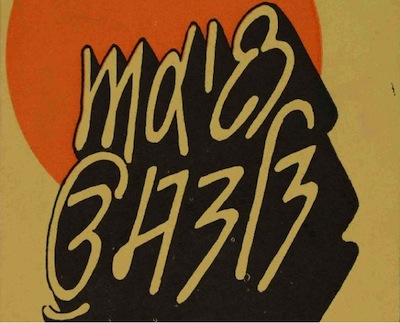
Akal Ustat
It is the second Bani in the Dasam Granth. This text spans from page 33 to page 94. It is composed of 271 verses, and is largely devotional in nature. ‘Akal’ translates to ‘Immortal’ and ‘Ustat’ translates to ‘praise of’. The text describes the many forms of the Almighty in nature, and how mankind perceives this great entity.
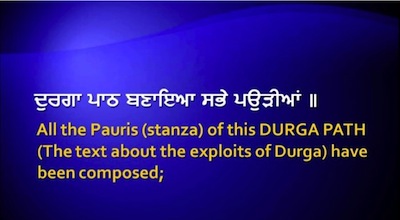
Chandi Ki Var
Chandi di Var also known as Var Sri Bhagauti Ji is a composition included in the 5th chapter of Dasam Granth. It is based on an episode from the Sanskrit work Markandeya Purana, and describes the conflict between the Gods and the Demons. The first part of the Var is known as the “Ardas”, the opening Section of Sikh prayer which invokes the names of the Gurus.